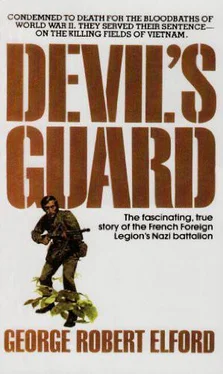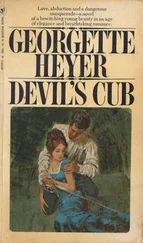Since we could light no fires in our camp, the meals had to be prepared by the hunting parties and brought back neatly portioned and roasted. One day Sergeant Krebitz suggested that we could solve our rice and potato problems, too, by carrying the stuff two miles into the woods for cooking. Thi and Chi decided that they could be of better use if they joined the hunting parties, especially when it came to the question of preparing the meals. Thereafter we enjoyed a marked improvement in the quality of our meals—the female magic touch. The girls collected sacks of wild vegetables, which proved delicious either cooked or prepared as salad with salt and spices.
Ten days went by before Riedl and his party returned upset and decidedly empty-handed. Helmut had not only failed to get explosives from the enemy but had not been able to approach the jungle road at any favorable point without severe risk. The Red Highway was expertly protected from interference on the ground.
“By God, Hans,” Helmut swore, “There are at least two thousand armed Viets with nothing else to do but sit along a twenty-mile stretch on guard duty. Whenever we found a suitable place for setting an ambush we bumped into bunkers and foxholes that covered the entire area with MG’s.”
It was a bitter blow but I couldn’t blame Riedl for the failure. The enemy was becoming wiser. Our activities behind their lines had had their effect. Unable to track us down and eliminate us for good, the Viet Minh decided to play it safe along their vital lifeline from China. We learned a few months later that Giap had deployed over sixty thousand guerrillas along the six-hundred-mile-long Red Highway with nothing else to do but protect it.
Riedl had acted wisely when he decided not to rush an attack that could alert the enemy and fail in the process. We all looked to Sergeant Krebitz for a solution.
“Well, Rudolf, it is all up to you now,” Schulze said hopefully. “We have come a long way to do a great job. It would be a pity to turn back now.”
“I cannot shit gelignite, Erich,” he replied crudely.
“Can’t we do something with what we have?” I asked.
Krebitz screwed up his lips and gave a low chuckle. “With what we have? We have already buried most of it in the ravine.”
“Any other solution?”
“Request an air drop.”
“We can’t have planes coming here, and to embark on another thirty-mile expedition…”
“Then I can see no other way but to strip the battalion, Hans.”
“Strip it of what? Revolver bullets?”
“Hand grenades.”
“Why, hell!” Erich exclaimed. “That is the solution. Everybody still carries grenades.”
“Sure, but it’s me who will have to rig them up piece by piece,” Krebitz grunted.
“Do you think it will work, Rudolf?”
“One can always try!” Soon Krebitz had a neat pile of over seventeen hundred grenades. “Here you are, Rudolf,” Riedl exclaimed with great enthusiasm. “You have all the explosives on earth. If you need any help just say so.”
“You’re most welcome,” said Krebitz, slapping Helmut on the shoulder. “Now all you have to do is to get your can opener, cut the shells, and scrape the candy into a rucksack. But don’t blow yourself up in the process.”
Three days later the ravine was set for blasting. All we needed was a thunderstorm. One finally came eleven days later and marked our thirty-third day in the woods, “Sitting it out” only two miles from the Red Highway. The moment the first thunder cracked the troops began to move out to take their positions along the ravine. It did not start to rain until well in the afternoon, when lightning bolt after lightning bolt illuminated the rolling clouds. Soon it sounded as though the skies were about to split apart. Synchronized with a savage thunderbolt, Krebitz plunged the detonator lever. The roaring thunder obliterated the explosions and had we not seen the flames we would have thought the charges had misfired. The rocky precipices tumbled down, triggering a land slide which filled the river up to fifty feet high. On the far side of the barricade the water began to rise rapidly.
The following noon a scouting party of twelve guerrillas was spotted wading upstream in the now barely trickling river. It was still raining but our dam held firm. We permitted the Viet Minh party to proceed right up to the dam and then to return to base without being molested. Just as Schulze had predicted, a large working party of about four hundred men arrived the day after, carrying demolition tools and satchels of explosive. Luckily it was still raining. The downpour deadened the sound of the machine guns. Confined in the ravine the enemy had no chance of fighting back. Most of them carried no weapons, only picks and spades. When they turned to flee, Riedl and his gunners were ready for them a mile downstream.
In twenty minutes the battle was over. The afternoon went by with no signs of another Viet Minh sortie from the base. At nine P.M. our dam sprang more leaks and looked ready to collapse. To prevent an ineffective partial burst, Sergeant Krebitz decided to blast the reservoir free. Carrying tons of rocks and broken timber, the torrent rushed downhill. Still swollen fifteen feet high when it reached the jungle road, the flood hit the guerrilla base with the force of a tidal wave. It was already dark so our observers witnessed little of the actual impact of the flood, but when we focused our binoculars the next morning on the enclosure I saw nothing but piles of debris amidst a shimmering swamp.
18. THE LAST BATTLE (OPERATION “FIREFLY”)
We left the area immediately, refraining from harassing the enemy along the road. We ignored half a dozen smaller transit camps, guerrilla checkpoints, and convoys in order to deny the Viet Minh a chance to determine our direction and our next target. A week’s trekking over very difficult terrain put a good forty miles between the swamped enemy base and ourselves. Our route took us up and down across a chain of steep ridges, some of which we had to climb to the summit, past the three-thousand-foot mark. We blazed our own trails most of the time, since that was the only way to avoid a few primitive tribal settlements whose inhabitants were alien even to our girls, and whose language none of us could understand. No one knew where the loyalty of the tribesmen might lie. I thought it prudent to avoid them altogether. Had we used their comfortable hunting trails, we could have made a faster journey but we would also have met with tribal hunters whom we would have had to kill in order to remain undetected in the area. News in the jungle can travel almost as fast as a teletype message.
The battalion stuck to the unbroken woods. Hampered by thorny thickets of wiry bracken and stingy shrubs which flourished with incredible vitality, we made our way. That ten days of trekking was probably more trying than a two-hundred-mile march on an open road. Yet even in the unbroken woods we came upon a small clearing with a primitive hovel, where a young tribal woman was looking after five naked children, all ridden with festering sores. Our sudden appearance terrified her, and she burst out in a torrent of high-pitched words which not even Noy could understand. Gathering her children, she was ready to flee into the woods when the sight of our girl companions quieted her fears. With some effort and by using at least as many signs as words, Noy succeeded in making contact with a female human being from the Stone Age. Her husband had been away hunting in the woods for five days. The family lived entirely on what the forest provided. They grew nothing themselves and had not seen money for years. The woman had no idea of a war going on in the country. Occasionally she saw armed people moving along the path down in the valley, sometimes as many as ten times ten armed bandits (she explained by showing ten times her open palms). They were neither white-faced nor as tall as we were. To her all armed men were bandits (including ourselves) and the words Viet Minh, Ho Chi Minh, Hanoi, French, Foreign Legion, army, terrorists, etc., had no meaning at all.
Читать дальше












